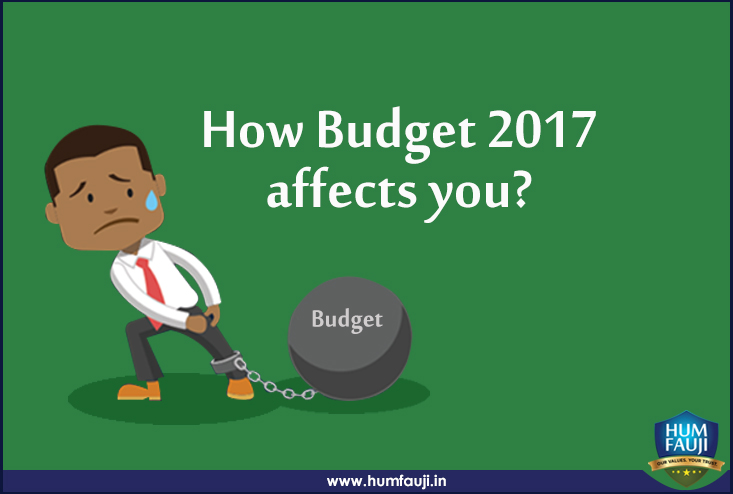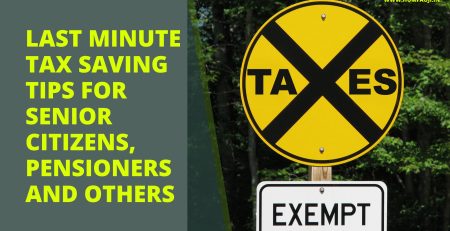By Vandna Negi, Financial Planner, Hum Fauji Initiatives
Whenthe global economy is going through a slowdown, India is striving to strengthen its socio-politico-economic fundamentals. Amidst various economic crisis across the world, India took a valiant decision of demonetising its high value notes which led to a temporary slowdown in GDP growth withjob loses, decline in farm incomes, and social disruption especially in cash concentrated sectors. However, it is expected to have a transient impact on the economy.
In the wake of economic turmoil, the Finance Minister presented the ‘expect the unexpected’ budget on 1st February, 2017 which seems simple yet impactful. Among various budget proposals introduced by Finance Minister, certain key considerations were given to the common man.
- For those with modest income, the budget granted a tax reliefand incited the to become tax compliant by lowering the existing rate of income tax for individual assesses drawing an income between Rs 2.5 – 5.0 lakh to 5% from the present rate of 10%. This tax reduction will bring about a savings of Rs 12,500.But on the other hand, the maximum rebate of Rs 5,000 for those whose total income did not exceed Rs 5.0 lakh, has been reduced to Rs 2500 and only for those resident individuals whose total income does not exceed Rs 3.5 lakh.
- For this income group, aOne page Income-Tax Return formhas been proposed which would eventually make tax filing for individuals easy.
- An additional surcharge of 10% has been levied on all individuals whose taxable income is between Rs 50 lakhs and Rs 1 Cr and 15% above Rs 1 Cr.
- Greater Penalty for delayed filing of Income Tax return to instil a sense of discipline amongst tax payers has been introduced. A fee of Rs 5,000 shall be payable, if the return is furnished after the due date but on or before the 31 December of the Assessment Year. A fee of Rs 10,000 shall be payable in case it is further delayed up to 31 March of next year.However, if the total income does not exceed Rs 5 lakhs, the fee amount will not exceed Rs 1,000.
- Real Estate will no longer be a long term illiquid asset with a changed period of Long Term Capital Gain for immoveable property. Presently, to qualify as a long-term asset, an immovable property is to be held for a period of 36 months or more. However, it is proposed to reduce the holding period to 24 months (i.e. 2 years). This amendment will give respite to individuals who are looking to sell their properties and get liquidity in this asset class.
- Another sigh of relief has come with the proposal of change in base year for indexation benefits.The base year for calculating the indexation benefit has been revised from April 1, 1981 to April 1, 2001. It was highlighted that assesses were finding it difficult to compute the capital gains in respect of a capital assets (real estate, gold or any other asset where indexation was applicable) acquired before April 1, 1981 due to non-availability of relevant information, especially the fair market value of real estate.
- Restriction on set off of loss from house property:In line with the international best practices, it is proposed to restrict the set-off of loss under the head “Income from house property” against any other head of income to Rs 2 Lakh for any Assessment Year. However, the unabsorbed loss shall be allowed to be carried forward for set-off in 8 subsequent years in accordance with the existing provisions of the Act.
- Expanded the scope of long term bonds under Section 54EC:The existing provision of section 54EC provides that capital gain to the extent of Rs 50 lakhs arising from the transfer of a long-term capital asset shall be exempt if the assesse invests the whole or any part of capital gains in National Highways Authority of India (NHAI) or Rural Electrification Corporation Limited (REC) Bonds. The scope of Section 54EC of the Income-tax Act, 1961 has been widened to include all bonds redeemable after 3 years which have been notified by the Central Government.
- National Pension System (NPS) has become more attractive with additional benefit of partial withdrawal not exceeding 25% of the contribution, made by an employee, would be exempt from tax. This proposed provision is in addition to the current provision of exempting 40% of the amount payable to the subscriber on closure of the account or opting out of NPS.
- Rationalisation of deduction for self-employed individuals depositing for NPS:Under the current provisions of Section 80CCD, an employee subscribing for NPS is permitted a cumulative deduction of 20% of salary, where as in case of other individuals, the total deduction under Section 80CCD is limited to 10% of gross total income.
In order to provide parity between an individual who is an employee and an individual who is self-employed, it is proposed to amend section 80CCD so as to increase the upper limit of 10% of gross total income to 20% in case of individual other than employee. - In line with the aim of moving towards cashless economy and curbing black money, it has been proposed to insert Section 269ST of the Act which states that no person shall receive an amount of Rs 3.0 lakh or more in cash:-
- In aggregate from a person in a day;
- In respect of a single transaction; or
- In respect of transactions relating to one event or occasion from a person
Only an account payee cheque or account payee bank draft or use of electronic clearing system through a bank account shall be permitted.
- Furthermore, in order to bring transparency to the source of funding by political parties, no donations of Rs 2,000 or more can be made in cash. Political parties will be entitled to receive donations by cheque or digital mode or electoral bonds from their donors.
Our Comments
The hard-nosed budget presented this year braces India to stand out as a bright spot in the world economic landscape. This is a no-nonsense budget which is a popular budget as it touches many areas and many lives but shies away from being populist. It has aimed to attempt a macroeconomic stability rather than trigger an immediate growth, which generally is not sustainable. It has tried to stabilise weak sectors like real estate and infrastructure, and has had a hard look at fiscal prudence on part of the Government with the aim of social and rural development. Lastly, it has tried to better the quality of spending in the economy by slowing down the revenue spending and increasing capital expenditure – this will ultimately lower inflation and increase productive spending.
For more information, feel free to reach us on, contactus@humfauji.in or call + 011 – 4240 2032, 40545977, 49036836 or
Subscribe to our blog for regular financial updates or follow us on | Facebook | Twitter | Linkedin to get latest insight on matters financial














Leave a Reply